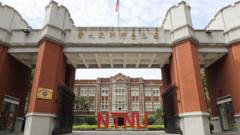An internal investigation uncovered a disturbing practice where students were allegedly pressured to provide blood samples under the threat of losing academic credits.
Taiwan University Coach Faces Backlash Over Controversial Blood Donation Demands

Taiwan University Coach Faces Backlash Over Controversial Blood Donation Demands
A sports coach at National Taiwan Normal University has apologized for coercing students into donating blood for research without proper consent.
In a striking incident at National Taiwan Normal University (NTNU) in Taipei, sports coach Chou Tai-ying has found herself at the center of a controversy following revelations that she pressured her students into donating blood for various research projects. The allegations, first brought to light by Taiwanese politician Chen Pei-yu, suggested that students were told their academic credits were at risk if they refused to participate. Chou, 61, has since publicly apologized for her actions, stating that her intent was to support her team, which faced a shortage of players often dealing with injuries.
The investigation revealed that blood sampling began in 2019 and extended to 2024, during which students were reportedly giving samples daily. However, the samples were later discarded due to improper collection methods. Chen Pei-yu had claimed the students were asked to provide up to three samples daily for fourteen consecutive days across multiple years. In addition to Chou, Professor Chen Hsueh-chih, who led one of the research projects, also issued an apology, acknowledging that the initiative, intended to assist student athletes, inadvertently caused distress and harm.
NTNU's principal, Wu Cheng-chi, apologized for the school's "negligence" and confirmed that the institution would reassess its ethics and oversight procedures. Concurrently, Taiwan's deputy education minister announced that a review of the case, including Chou's and Chen's actions, would be conducted. The education ministry also indicated potential revocation of a coaching license for another unnamed women's football coach at NTNU.
As the situation unfolds, it raises significant concerns over the ethical practices in academic research at Taiwanese universities, prompting discussions about the need for stronger oversight and informed consent within educational institutions.
The investigation revealed that blood sampling began in 2019 and extended to 2024, during which students were reportedly giving samples daily. However, the samples were later discarded due to improper collection methods. Chen Pei-yu had claimed the students were asked to provide up to three samples daily for fourteen consecutive days across multiple years. In addition to Chou, Professor Chen Hsueh-chih, who led one of the research projects, also issued an apology, acknowledging that the initiative, intended to assist student athletes, inadvertently caused distress and harm.
NTNU's principal, Wu Cheng-chi, apologized for the school's "negligence" and confirmed that the institution would reassess its ethics and oversight procedures. Concurrently, Taiwan's deputy education minister announced that a review of the case, including Chou's and Chen's actions, would be conducted. The education ministry also indicated potential revocation of a coaching license for another unnamed women's football coach at NTNU.
As the situation unfolds, it raises significant concerns over the ethical practices in academic research at Taiwanese universities, prompting discussions about the need for stronger oversight and informed consent within educational institutions.




















